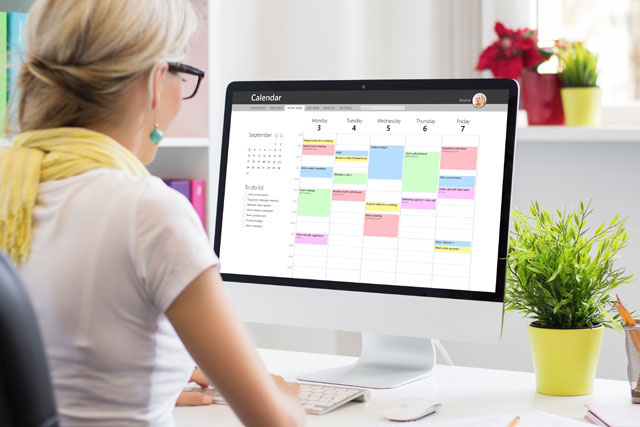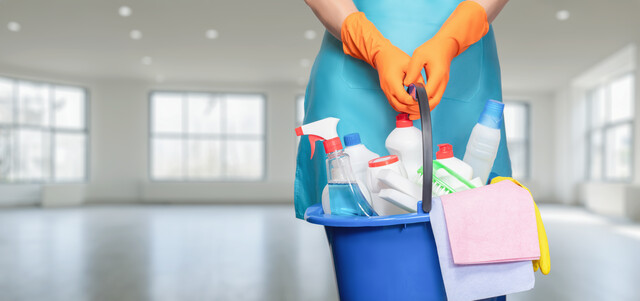Step 1: Determine the Type of Service You Will Offer
By now, you should have an idea in mind of which direction you are going to take this business. Determine whether it will be a window cleaning service, a domestic cleaning service, a floor cleaning service, or one of the many other options. There is a wide variety of choices for what you can pursue, but the equipment that you need comes down to which service you choose to focus on. Once you have made that decision, then you can start narrowing in on what you need for that specific industry.
Take into account that certain industries will require more heavy-duty or expensive equipment, so if your finances are low, you should be cautious of which service type you choose. When finances are tight, you might need to narrow the amount of services you offer, as offering a variety of services will mean more equipment that is necessary and supplies, as well as extended training for your employees. It might seem that you would pull in more clients if you offer floor cleaning, window cleaning, and blind cleaning, but be careful of spreading your business too thin. You might not be able to afford all of the equipment to run three different types of service right away. Consider starting small and focused on a single specialty, and then offering more services as your finances allow it. One of the industries that doesn't require as much heavy-duty equipment would be residential cleaning, whereas pressure washing and carpet cleaning require more intensive tools.
Step 2: Invest in the Larger Equipment
The large equipment needed for your specific cleaning service will be one of the first things you want to invest in, as this is usually the primary component to the cleaning process. If you wait and instead use up your funds on smaller items, you might only have enough funds left over to afford a cheap version of whatever it is that you need. Whether you need a rotary machine or a floor-polishing machine, you should invest in a high-quality brand and make. Look into reviews and ratings to make sure that the brand you buy is reliable and durable, and that it is intended for frequent commercial use.
Plan to get a lot of use out of this equipment, so it should last you a long time and preferably have a warranty. Cheaper brands might not offer warranties and yet are more likely to break down quickly, so you'll end up spending more money replacing them again and again. Another reason you should put more money into the heavy-duty equipment is because the top brands are more likely to have additional features or better cleaning properties, so you can provide your customers with higher quality service.
Starting out, you might not be able to afford the top-of-the-line brand or the latest edition, and this is not an unusual problem for a small business. Just take a moment to look through your finances and figure out just how much of your budget you can attribute to this equipment without hurting other areas of your business. Find a middle ground by buying the highest quality you can afford without bankrupting your business over it. Invest in a warranty if it's reasonable because this can save your finances down the road if the equipment has problems.
As mentioned in Step 1, some industries will call for more heavy-duty equipment. However, even residential cleaning requires a commercial-grade vacuum, so with any of the cleaning service types you will need to prioritize which equipment is most crucial and should be bought first. If it helps you to visualize, make a list in order of priority and then plan out your budget that you can attribute to each item. This can help you keep from overspending in one area and not having enough left over for something else.
Step 3: Accumulate the Smaller Supplies
There's going to be a wide selection of smaller supplies you need, such as brooms, rags, spray bottles, and other items depending on your specific service. When you have a small business with only a couple customers, you can most likely just buy a few of each item and be good to go for a while. Once your business grows and you have multiple teams taking on several customers, then you'll need to look into buying these items in bulk to stock up and save money. This is where finding a supplier can come into play, as discussed in the previous chapter.
Before you start taking on clients, make up a list of all the supplies you think you will need to get the job done efficiently, and then accumulate all of these before your first cleaning job. As you gain experience, you will figure out additional items you need that might make the job easier, so you can add on to this list and always make sure that you have the right amount of items in store to supply all of your cleaning teams with adequate supplies.
Keep these supplies in good condition, and when you notice that a broom or mop is wearing down, and then restock on new equipment. Keeping up with the quality of your equipment will help you maintain a professional appearance and provide quality service.
For an idea of what small supplies you might require for a residential cleaning service, for example, take a look at this list:
- Vacuum cleaner with attachments
- Broom
- Mop
- Bucket
- Dustpan
- Duster
- Spray bottle
- Rags
- Window cleaner
- Toilet bowl cleaner
- Paper towels
- Trash bags
- Latex gloves
- Wet floor sign (if working in commercial areas)
- Extension cords
- Container for supplies
Depending on your client and the space that they want you to clean, this list may change or even grow longer. The necessary supplies might change depending on whether you have a residential or commercial client, as commercial clients might have stricter requirements and regulations for what you use. Residential clients can also be specific, and may ask that you use their vacuum or some of the supplies they already have.
Step 4: Choose your Chemicals or Cleaner
Nearly every type of cleaning service requires that you choose a specific chemical or cleaner to get through the bad stains or messes. If you choose a specific chemical to clean, always try it out before you use it in a client's home or order a large abundance of it. You also need to take into consideration that some clients might not be okay with strong chemicals in their home, whether for health reasons or environmental reasons. You can either ask that they provide alternatives if they don't like what you use, or you can look into a more "green" approach as an alternative for clients who request it.
Having the flexibility of a "green" option can open you up to a wider client-base, so it might be something to look into, especially as your business grows. There are several different approaches, some of which incorporate baking soda or essential oils, which shouldn't irritate your customer's allergies or give them headaches. Since this is such a big movement and many customers are requesting the switch, then your investment in this type of service will most likely pay off.
Step 5: Get the Necessary Office Supplies
In order to organize the business aspects to your cleaning service, you will need some office equipment to keep it professional. When you are first starting out, you might not have enough clients to require an advanced office system, but as your business grows, you will need professional organization. You will need an efficient, secure PC to keep up with customer's files, find suppliers, and run your marketing campaign. It needs to be a secure system as you will most likely have confidential customer information, and you need to be able to guarantee your customers that their information is secure.
As your customer list grows, you might also be interested in obtaining a separate phone line for your business. This will help you keep your business and personal life separate. You can leave your business phone off when you don't have business hours, so that you won't be bothered during your personal life with customer's phone calls or texts. It also helps you keep your contacts organized, rather than having all of your customer's phone numbers in your personal phone.
Once you have a successful business and can afford to put some of your funds towards something bigger, you might consider buying company cars for your cleaning teams to use. A uniform look to your vehicles can increase your professionalism, rather than using personal vehicles. This can aid in marketing and show your customers that you are a serious and advanced business.
Step 6: Gather Marketing Supplies
This is still something you could need equipment or supplies for, depending on your strategy. At the most basic level, you will need some professional-looking business cards to give out your information. You can buy these in bulk for a reasonable price from a great number of websites.
Another reasonable purchase would be magnets or stickers with your business logo on them, to put on your vehicle so that your contact information and business name is clearly visible as you are out working. If you can't yet afford to buy business-only vehicles, this is a great way to transform your personal car with a more professional look.
If you choose to use online marketing strategies solely, then the only equipment you'll likely need is a PC to maintain your online platform. You might choose to carry out marketing with actual signs and flyers, in which case you will need access to a printer or a company that can help you print professional-quality posters.
Step 7: Consider Software for Human Resources and Finances
Whoever is in charge of this area of your business could benefit from software designed for this specific field. Whether it's as simple as Microsoft Excel to create worksheets for your budget, or a specialized program you find online, this could benefit you as your business grows.
If you choose not to hire an HR manager right away but instead take care of the responsibilities yourself, then having a program to guide you will help make sure you get the job done correctly. Making sure that you cover all your bases in these two important areas (Human Resources and finances) will keep you from future issues and stress. Laying out your budget and current financial situation on an easy-to-read spreadsheet can help you stay informed about your finances and any holes you might have in the budget. These are important aspects to making sure you put your money to good use, don't overspend in a certain area, and don't run out of funds too quickly. Having the right software and set-up to monitor these areas of business will make it easier for you to stay on top of things.
Step 8: Find the Right Employees
Now, this might not seem like it fits right into the equipment , since the people you hire certainly aren't equipment in any way. However, they are a valuable resource to your business and can make all the difference in the growth of your endeavor. Finding employees that you can trust, and that your customers can trust, is an essential step to building your resources and your business. Reach out in local ads, online, at the local college, or through an employment agency. Even if the employees you hire don't have any experience in the cleaning industry, you can use this opportunity to train them to clean in the manner that you wish the job to be done. Other Resources, so take the time to read that and then work on finding and training qualified employees.
Step 9: Find Somewhere to Practice and Train
The final thing you need to do is put that new equipment to the test before you use it for a customer! You can always clean your own home, but you won't gain too much experience just working in the same space continuously. Ask around with friends, neighbors, and family members to see if anyone wants a free cleaning! This will give you the opportunity to break in the new equipment and get experience at using it, which is critical before you start cleaning customer's homes. You can also use this opportunity to find places to train your new employees with the equipment. It shouldn't be too difficult to find a handful of people who don't mind a free cleaning every now and then!
All of the equipment and resources covered in this article will take you another step closer towards your business goals and a successful cleaning service. Preparation and planning will help you through the obstacles that arise with any entrepreneurship and new business, so walk through these steps to determine what you need to complete as you start your cleaning service.































